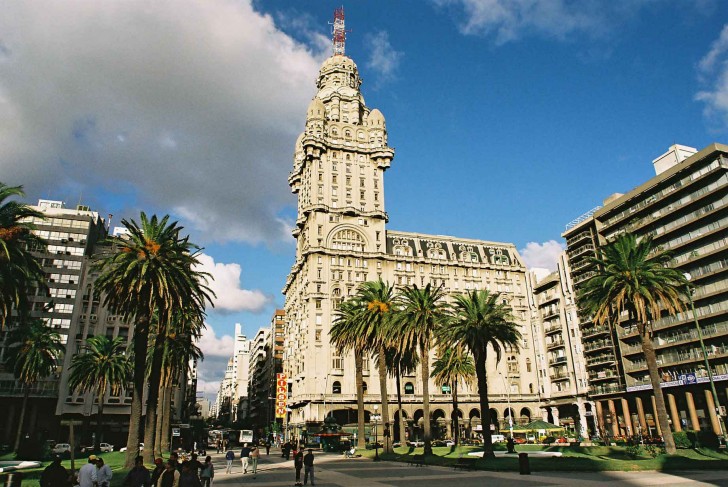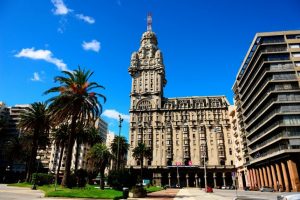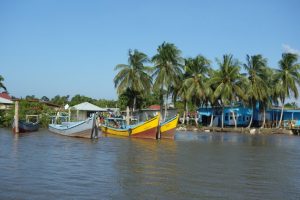 Uruguay : Safety by City
Uruguay : Safety by City
Tucked between Brazil and Argentina, Uruguay quietly offers one of South America’s most relaxed and rewarding travel experiences.
This small coastal country stretches along the Atlantic Ocean.
It has rolling plains, beach towns, and a culture deeply rooted in European heritage and Latin American rhythm.
Uruguay’s history is shaped by colonial power struggles.
Before it became independent in 1828, Spain and Portugal vied for control.
Since then, it has developed into one of the most politically stable and progressive nations in the region, known for its strong democracy, social freedoms, and quality of life.
Montevideo, the capital, serves as both the cultural heart and political hub, while coastal resorts and pastoral interior towns offer a more unplugged experience.
What draws around 3.3 million visitors annually isn’t flash or spectacle—it’s the slower pace, safety, and authenticity.
Travelers come to unwind on Atlantic beaches, experience Uruguay’s emerging wine scene and soak up the laid-back atmosphere.
Uruguay’s vibe leans into calm—long dinners, horseback rides through countryside estancias, and evenings spent listening to candombe drums in city streets.
While often overshadowed by its larger neighbors, Uruguay earns its reputation as a hidden gem—quietly confident and culturally rich without the crowds.
Warnings & Dangers in Uruguay

OVERALL RISK: LOW
Uruguay is relatively safe, but travelers should still stay alert, especially in urban areas like Montevideo. The overall risk is low, but don't let that give you a false sense of safety. There are some troublesome areas.

TRANSPORT & TAXIS RISK: LOW
Public transportation and registered taxis are generally reliable and pose low risk. Ride-sharing apps like Uber and DiDi are widely used in cities. Just avoid unmarked taxis and keep an eye on your belongings during bus travel, especially at major terminals like Tres Cruces in Montevideo.

PICKPOCKETS RISK: MEDIUM
Pickpocketing is one of the more common crimes tourists face, particularly in busy markets, bus stations, and downtown Montevideo. The risk is medium, especially in crowded areas.

NATURAL DISASTERS RISK: MEDIUM
Uruguay has a very low risk of natural disasters. There are no active volcanoes, hurricanes, or earthquakes. Occasional flooding can affect rural areas or roads after heavy rains, especially in summer, but it rarely impacts travel plans.

MUGGING RISK: MEDIUM
While not rampant, muggings do happen in certain Montevideo neighborhoods, especially after dark. The risk is medium in less crowded or poorly lit areas. Avoid walking alone late at night, particularly in Cerro, Casavalle, or La Teja. Take a taxi or rideshare if you're unsure about the area.

TERRORISM RISK: LOW
There’s a low risk of terrorism in Uruguay. The country has a stable government and hasn’t experienced any recent incidents. Still, as with any destination, it’s smart to avoid political gatherings or protests, particularly those near embassies or government buildings, just in case tensions flare.

SCAMS RISK: MEDIUM
Scams in Uruguay are not aggressive, but the risk is medium. Tourists may encounter taxi overcharging, counterfeit bills in change, or sketchy currency exchange offers. Stick to official taxis, use ATMs at banks, and decline unsolicited help from strangers with things like ATMs or ticket machines.

WOMEN TRAVELERS RISK: LOW
Low-level street harassment like catcalling still happens, particularly in cities. While the risk is low, you should keep your defenses up, especially if you're enjoying the nightlife. Never take a drink from a stranger.

TAP WATER RISK: LOW
Tap water in Uruguay is generally safe to drink and considered low risk. That said, some travelers prefer bottled water in rural areas or during heavy rains when the taste or clarity might be off. Urban water systems are regulated and reliable, especially in Montevideo and coastal towns.
Safest Places to Visit in Uruguay
The official tourism website is uruguay.uy.
Look at the Visit section for all the travel information, including practical tips and regional breakdowns of things to do.
Those visiting Montevideo need to read the next section about places to avoid, but there’s also plenty to see in the capital.
Neighborhoods like Pocitos, Punta Carretas, and Ciudad Vieja are the best options during the day.
The Rambla, a 13-mile coastal promenade, is perfect for walking or biking.
Explore the Mercado del Puerto for local crafts and parrilla-style barbecue, and check out the eclectic architecture in the historic center.
The Teatro Solís, one of South America’s oldest theaters, is worth a guided tour.
Punta del Este is Uruguay’s upscale beach city, known for its long stretches of sand, modern skyline, and art-filled landmarks like Casapueblo in nearby Punta Ballena.
Playa Brava’s sculpture La Mano (The Hand) is iconic.
Further east, José Ignacio offers a more relaxed, boho-chic vibe popular with international travelers.
Colonia del Sacramento is a UNESCO World Heritage Site and one of Uruguay’s safest and most charming towns.
Cobblestone streets and colonial architecture make for a relaxing day or weekend trip.
It’s worth noting there’s a ferry to Buenos Aires from Colonia del Sacramento.
Uruguay’s Wine Country is known for Tannat, Uruguay’s signature grape.
Many vineyards offer tastings and tours—easy to access with a driver or guided excursion.
Head north to Quebrada de los Cuervos, a protected area with hiking trails and canyon views.
Santa Teresa National Park along the Atlantic coast combines beaches, hiking, and a historic fortress.
For birdwatching and quiet wetlands, Esteros de Farrapos National Park near the Río Uruguay is worth the detour.
Places to Avoid in Uruguay
The biggest risks come in the capital city of Montevideo.
As a little tip, I always recommend reading the Canadian travel advisories since they get into a lot of detail—even down to street level in some instances.
Montevideo is generally safe, but neighborhoods like Casavalle, Cerro, and La Teja have higher crime rates, including theft and occasional gang-related violence.
Tourists don’t usually have a reason to go there anyway.
Canadian officials also recommend avoiding these parts of Montevideo.
- 18 de Julio Avenue
- La Ciudad Vieja (the Old City)
- Plaza Independencia
- Puerto de Montevideo (the port area)
- 40 Semanas
- Barrio Borro
- Bella Italia
- Casabó
- Casavalle
- Hipódromo
- La Teja
- Malvín Norte
- Marconi
- Tres Ombúes
- Villa del Cerro
- Villa Española
Uruguay’s beach towns can come with increased crime during winter.
The United States specifically mentions using caution in these locations:
- Punta del Este
- La Barra
- La Paloma
- Cabo Polonio
- La Pedrera
- Punta del Diablo
That includes your safety and burglaries or break-ins to your hotel room or rental.
Safety Tips for Traveling to Uruguay
- Uruguay’s national police force handles most law enforcement. In Montevideo, there’s also a Tourist Police unit that patrols high-traffic visitor areas. For emergencies, call 911 (same as in the U.S.). Tourist Police can be found near Ciudad Vieja and other busy zones.
- To stay updated on natural disasters or public emergencies in Uruguay, download the “Uy Alerta” app or follow SINAE (Uruguay’s emergency system) on social media. Alerts are usually in Spanish, so basic language skills or a translation app can help. The U.S. embassy also issues alerts—sign up for STEP (Smart Traveler Enrollment Program) before your trip.
- You can drive in Uruguay with a valid driver’s license from your home country and your passport for up to 180 days. There’s no need for an International Driving Permit, but it can be handy if your license isn’t in Spanish. Always carry rental documents, and note that headlights must be on—even during the day.
- Peaceful protests are common in Montevideo, especially around the Legislative Palace, Plaza Libertad, and universities. Some are critical of U.S. policies but rarely violent. Avoid large gatherings, even if they seem festive (like post-soccer celebrations), as they can turn chaotic. The U.S. Embassy area can also be a protest spot—better to steer clear.
- Bring prescription meds in their original packaging with your doctor’s script. There are no strict import limits for personal use, but don’t assume you can refill prescriptions locally. Some medications, especially brand names or specialized treatments, may not be sold in Uruguay. Carry enough for your entire stay to avoid issues.
- Summer in Uruguay (December to March) can bring mosquito-borne illnesses like dengue, along with occasional upticks in stomach bugs. Always use repellents, especially near wetlands or rural areas. Long sleeves in the evening help, too—mosquitoes get more active at dusk.
- Uruguay’s beaches look calm, but rip currents can surprise swimmers, especially outside lifeguard hours. Red flags mean no swimming—heed them. Avoid isolated spots if you’re alone, and be careful of rocky areas, which can be slippery or have sea urchins. Summer lifeguards are usually present at main beaches like Pocitos and Punta del Este.
- Uruguay doesn’t have dangerous wildlife in the way some other South American countries do. But jellyfish can appear in summer—purple flags on beaches warn you. In rural areas, ticks and snakes are rare but possible. If hiking or camping, wear closed shoes, shake out bedding, and check your ankles now and then.
- Uruguayan nightlife runs late. Really late. Clubs often don’t get busy until 2 a.m., and many bars don’t fill up until midnight. That means walking home at 4 or 5 a.m. is common—but not always wise. Stick to well-lit areas or take a taxi or Uber, especially if you’re unfamiliar with the neighborhood.
- Renting a car is doable, but parking is tricky in Montevideo and beach towns during high season. Break-ins do happen, especially when cars are left on the street overnight. If your hotel or rental doesn’t include secure parking, consider whether a car is worth it—public transport and short flights can work well too.
So... How Safe Is Uruguay Really?
Each government ranks the risk levels of individual countries for its citizens.
By and large, the ranking on the four-tier system is relatively uniform.
However, the United States lists Uruguay as Level 2, the second-lowest level, which means “exercise increased caution.”
The only thing that stands out to me is that the warning dates back to July 2023.
I would recommend checking that before a trip, as it might go down.
Canada, the United Kingdom, and Australia all rank Uruguay at the lowest level, which is Level 1: Exercise Normal Precautions.
At the same time, they all mention in some capacity the elevated risks in Montevideo and Brazilian border towns.
Canada also mentions the elevated risk during summer (again, December through March in South America), noting that criminals are quite active in Punta del Este, Rocha, and Colonia del Sacramento.
While Uruguay isn’t the safest city in South America, it’s far from the most dangerous.
Enhanced safety precautions and common sense will go a long way here.
How Does Uruguay Compare?
| Country | Safety Index |
|---|---|
| Uruguay | 77 |
| Morocco | 54 |
| Norway | 85 |
| Mauritius | 80 |
| Namibia | 71 |
| Germany | 85 |
| Romania | 80 |
| Mongolia | 71 |
| Netherlands | 75 |
Useful Information

Visas
Most travelers from the U.S., EU, and several other countries don’t need a visa for stays up to 90 days. Your passport should be valid for the duration of your visit. Always double-check entry requirements before travel, as rules can change and may vary based on nationality.

Currency
Uruguay uses the Uruguayan peso (UYU). Credit cards are widely accepted, and foreign visitors often receive a tax break on card purchases at restaurants. It’s still a good idea to carry some cash for small shops or taxis. ATMs are easy to find in cities and towns.

Weather
Uruguay has a temperate climate with mild winters and warm summers. December to February means summer and beach season, while June to August brings cooler weather. Rain is fairly consistent year-round. Pack layers, especially if visiting between seasons or heading inland, where temperatures can vary more.

Airports
Carrasco International Airport (MVD) near Montevideo is the main gateway for international travelers. It’s modern, efficient, and offers connections to major cities in South America and beyond. Smaller airports in Punta del Este and other cities handle domestic and some seasonal international flights, especially during summer.

Travel Insurance
Travel insurance isn’t required to enter Uruguay, but it is strongly recommended. It can cover unexpected medical expenses, trip delays, and lost luggage. Healthcare is good, but private treatment can be costly without coverage. Look for a policy that includes emergency evacuation and support in Spanish-speaking countries.
Uruguay Weather Averages (Temperatures)
Average High/Low Temperature
| Temperature / Month | Jan | Feb | Mar | Apr | May | Jun | Jul | Aug | Sep | Oct | Nov | Dec |
|---|---|---|---|---|---|---|---|---|---|---|---|---|
| High °C | 29 | 28 | 26 | 23 | 19 | 16 | 15 | 17 | 18 | 21 | 24 | 27 |
| Low °C | 18 | 18 | 16 | 13 | 10 | 7 | 6 | 7 | 9 | 11 | 14 | 17 |
| High °F | 84 | 82 | 79 | 73 | 66 | 61 | 59 | 63 | 64 | 70 | 75 | 81 |
| Low °F | 64 | 64 | 61 | 55 | 50 | 45 | 43 | 45 | 48 | 52 | 57 | 63 |
Uruguay - Safety by City
| City | Safety Index |
|---|---|
| Montevideo | 44 |












It’s actually not that safe
Absolute hogwash review. Four hundred plus homicides a year. Parts of Montevideo are not to be walked in at night. Very hungry people rummage round ugly green trash containers. Most houses have iron railings on all windows because of rampant sometimes violent burglaries. A recent petition on safety – vivir sin miedo signed by more than two dozen…… I don’t exagérate.
Setting things straight
I ‘m a Uruguayan leaving in USA and most of the review is exactly as described, however because the very relax borders with other countries, Argentina and Brasil and drugs smuggling , this caused the Increased (on the latest years ) of crimes. The Youth from poorest homes have rooted issues due to growing up in single parents homes or with abusive parents with behaviors based on addictions ; moms had to leave the nest to Work so youngsters are left alone after school to do as they please. In addition Uruguayans are Educated due to FREE schooling and college.You may find Medical, Law or Veterinarians Students or graduates working in city buses collecting fees. I would safely say that 95% of the population has a diploma or trade. There are lots of farmers children working in the dormitory cities adjacent to the Capital Montevideo offering their goods in street markets. As far as religion the Catholic Apostolic Church takes the lead and the African Vudu religions are practiced by the fewer and normally linked to to poverty in Poorest barrios. Uruguay is one of a kind and you Can enjoy all it has to offer with the American dollar and travel it up the coast in pretty much one day by car . The government’s of Uruguay has improved the look of the cities and parks now pattering it to USA and people such as my family embraced the New way and still preserving the organic life style. As far as the window railings everybody whom understands the culture knows Colonial style decors is common therefore the windows project it.
Yeah right….Montevideo is NOT SAFE!!!
👍👍👍
I travel many times and I don’t think that’s the case, I never had problems and people are very friendly even if I don’t know you
WENT TO RIO INSTEAD, THANKS!!
Rio has more crime
Wait…you went to Rio because of the small amount of crime in Uruguay?? are you aware of the crime rate in Rio? This makes zero sense. Go to Rio for the food, culture and sites, but not for low crime!
Lol ; Río how many times; did you get Rob ?? I go to Río every year;; I had a friend from Argentina he got mugged three times in one week ,,, I never did Bcse I speak Portuguese en look Brazilian 🤣🤣🤣🤣
LOL! In South Africa we do 60 homicides a day. We also do 120 rapes a day. So in South Africa we do in a week what Uruguay can only achieve in a year. We also have communist ANC race based laws and policies that discriminates against whites purely on skin color. For one as a white you can’t get work because the laws of the country reserve positions for Africans, Indians, Chinese, Pakistanis and then lastly if there is any positions left (which never happens) then a white will be considered. This all regardless of qualifications, skills and knowhow. Uruguay sounds like heaven to me.
Dont agree with your comments. I went to Uruguay during the last 2 years an had an incredible time.
Citing absolute numbers of homicides is meaningless. One needs to know RATE (per 100k is standard) to determine probability or risk. Also it’s helpful to know how many murders are familial since those are the most common in many places and the risk of being killed as a tourist is much lower than being a native housewife (very true in the US for example).
I
Article is dead wrong. Uruguay is not safe
What a piece of shit of article. Uruguay is insecure nd more and more people Are been robbed daily, many times violently and at any time of day. Worse, police is inept and unwilling to do
Anything when crime is reported.
One has to guess at the motivation or corruption of writing an article so misleading.
Problems
I agree.. Lived there for five years.. An attorney took upon her self to keep money for her on when I sold my apt.. The thing was I did not hire her.. She was the buyers attorney ..
It was stated that she was in need of money..Daaaa.. My money.. Never seen again..will never go back again..
People are not friendly to Americans .. They are all to much into politics..
Enough said…
A good choice for SA
If you want to travel to South America, Uruguay is one of the safest places to go. With that being said, it does come with some risk. I would not say it was entirely safe nor would I tell people never to visit. It is one of those places you plan for and go with a group to see. I have been there twice this year and both experiences were just fine.
Really don’t know where folks get the idea that Uruguay is the safest place anywhere. On many lists it has a higher murder rate than Argentina, Bolivia, Chile, Peru, and Paraguay. Just cause it’s the most expensive don’t mean it’s the safest.
It's okay
My sister and I traveled to Uruguay as part of a spiritual journey. We both were excited to be going to South America and couldn’t wait based on the pictures. We did not have a great time. We had issues with the place we were staying in. We noticed many of the restaurants were not very clean. And on several occasions, we saw some homeless people looking through trash bins. It was more stressful than relaxing!
Are you fu**ing serious? Who are you, Paris Hilton?
What exactly does a Spiritual Journey mean? Were you trying to find yourself or God?
Just curious?
You were on a spiritual journey but were appalled by homeless people looking for food. Let me guess. You’re from Texas.
I’ve seen way more homeless people in LA or San Francisco than anywhere in Uruguay.
None... wondering whether to visit or not
,😂😂👍
I couldn’t agree more ; Río it’s great but you have to be aware of everything around you ;; or else you lose !!!
Rio don’t play
So, your “spiritual journey” just got clobbed by some homeless that meddled in?
What a misfortune! You spend some thousand dollars in your spiritual development and cannot afford some people in need? From your words anyone can make what your spiritual reality is made of.
You’re in great need indeed…
How can you continue to disagree with State Department warnings-it is very dishonest !
I love Uruguay
yes, but is like a any other’s country, i,m from p.r usa, and i rather visit urugay ,
i love that country , i, fell at home, crime,s happen any place, ….
1965-1967. wonderful country interior.
was in peace corp 1965-1967. spent most of my time in the interior. only 6 months. in montevideo. the interior was wonderful; montevideo was under seige by the communists. a real contrast to what i am reading today. but it was a great and safe experience after spending 2 years in vietnam. love reading your comments.
Yes, there are homeless people in the main parts of Montevideo and a bunch of street scammers!
Safety is relative. Uruguay is safe compared to other Latin American counties. But it's not safe in general
I’ve lived in Uruguay for a couple of years and can tell you it’s not safe. Yes, it definitely is much better than any other Latin American country in that sense, however, it’s not a place where you can relax and walk wherever you want at whatever time if the day or night. While living there, it got to the point where every single person you spoke to got either mugged or worst case scenario, at gunpoint. My local supermarket, bakery, very, corner shop etc, were being either held up at gunpoint or broken into almost every other day. It is a beautiful country. It does have that freedom of speech, it is trying very hard to be progressive (and taking into consideration its history, environment and conditions, had made much, much progress). I love Uruguay. I adore its people. The coast is beautiful. The markets are fantastic… and the food is spectacular. I’ve been at least half a dozen times and look forward to my next trip.
wake up..
I think it depends which country or big city you compare it with.
Most large cities in the world experience violence and have streets you shouldn’t enter day ore night. And unfortunately you find poverty everywhere. Also in small cities or villages all over the world. Some you find in the streets, others are covered-up behind the curtains, also drug abuse and violence. You want a safe trip.., run circles in your house. Risk is everywhere you go. That is how the hole world changed. You want a nice relaxed vacation.. contact a local with a clear and nice background, let them guide you to places that are nice without any harm, they know where to go. You will then experience just a part of the reality, but at least you’ve had a nice relaxed time.
Be careful!
Wake up is dead on in his/her opinion. I have been to Uruguay for 19 straight years In January-February, but not this year. (Pandemia!)
Do not go out at night and be attentive to your surroundings.
But! It is a super country. The people, the beaches, the food are great. It’s expensive, but worth it.
Be careful but have a great time!
I thank for the honest comments, otherwise i would relocate there! so it.s all just Adverts to kure foreigners in..thanks! 🤗
I really thank those who tell the truth! i was worried bcs estate prices decrease and as it was called to be clean, cheaper than Europe and warmer as my homecountry Austria..I thought I wouod relocate there! as it seems within 4 yrs it has, as so many countries, lost it safety and such…in comments on youtube you can read the weirdest stuff🤷♀️as in every country there are the endless liars who tell you it.s safe , clean and wonderful…as I come from Europe i saw the wunderful cuisine and asked myself : it,s just a burger? so what? and so on…
sadly i don,t know where to go, but Latin countries are a no go as it seems, i do research for over two yrs and seemingly that has become a common trade all over the world and covid makes it worse, as countries with no safe social net are now starving their people…Asia as USA , there is no difference,..i have so many contacts telling the real situation 🤷♀️thnaks for this obviously real honest comments with current! experience! not old stories…in the 90 ies Eastern Europe was safe too, thanks!
You sound like you have a very closed mind.
Travel Uruguay to feel good.
I read all that reviews & get cofused whether Uruguay is safe for travelling or not.
In my final opinion A traveller should travel with a positive mind ,Every where during this journey may not be pleasurable .All incidences good or awkward are part of journey as it enrich experience to travel & tackle the odds.After all Uruguay has a beautiful natural beauty with friendly people but with low resource of their own.Also legalization of taking marijuana the main cause of increasing unpleasant activity among the middle class or poor people.
Accurate
Im from Uruguay, I lived there for 27 years and travelled the world. I can tell you Uruguay it’s safe, you got to be carefull in some places like around Montevideo city (north of Avenida Italia street I would say is the division line) and in Canelones. Other touristic cities like Punta del Este, Colonia, or more east beach towns are very safe and you can walk at any time without concerns. In Uruguay we don’t have tourist scams (like in turkey with the shoe cleaners, el cairo with the scams on pyramids, paris in the tour eiffel) it is very rare. I would probably say that Uruguay doesn’t have a well formed touristic circuit like other countries so connectivity between towns and cities can be challenging and also between other countries ( usually people come from chile, brazil or colombia because there are not many direct flights). But Uruguay is a beautifull country, especially if you go to Rocha beach towns, go to Punta del Este ( museo casapueblo is an amazong experience at sunset) visit the countryside or just go for a walk on the Rambla and visit the Centenario, old town in Montevideo.
The people in Uruguay are usually very friendly (in my opinion one of the most friendliest countries with tourists), and will love to help if needed. If you are a student and want to come to Uruguay, check Mis Uruguay on instagram for more exchange students and activities.
Hope this is helpful to someone.
Gracias Rodrigo por representar apropiadamente nuestro gran pais. Yo vivo en Schenectady en NY y extrano tanto.
Venezuela
Venezuela is the most dangerous across the board.